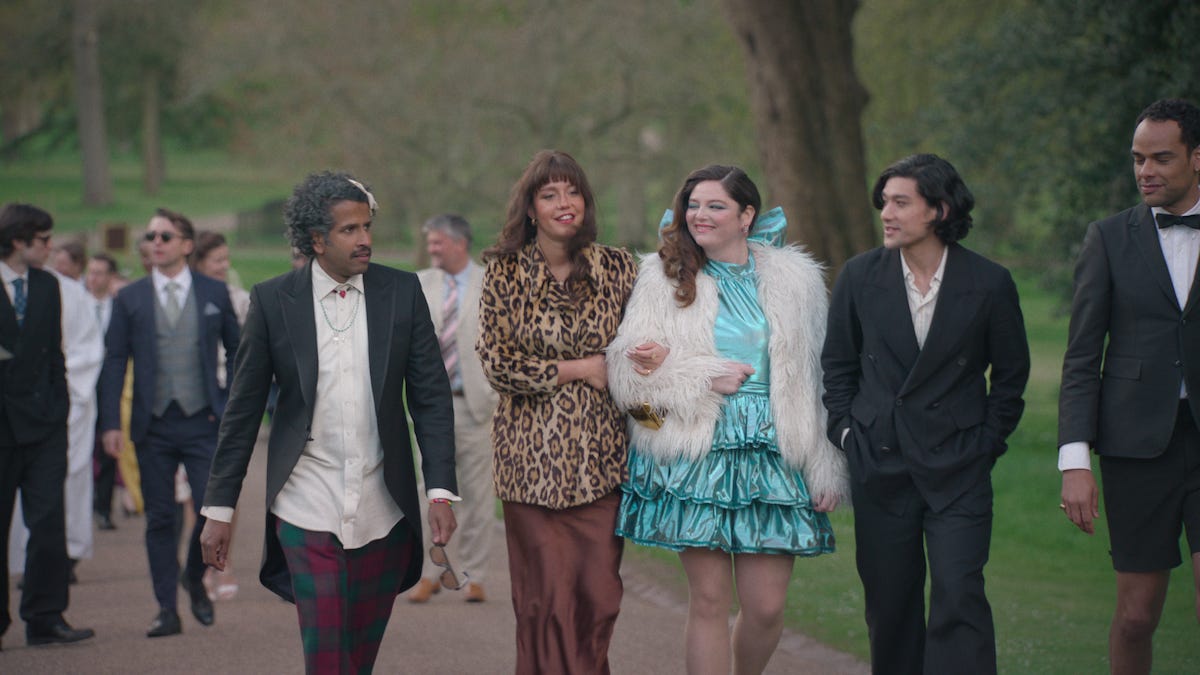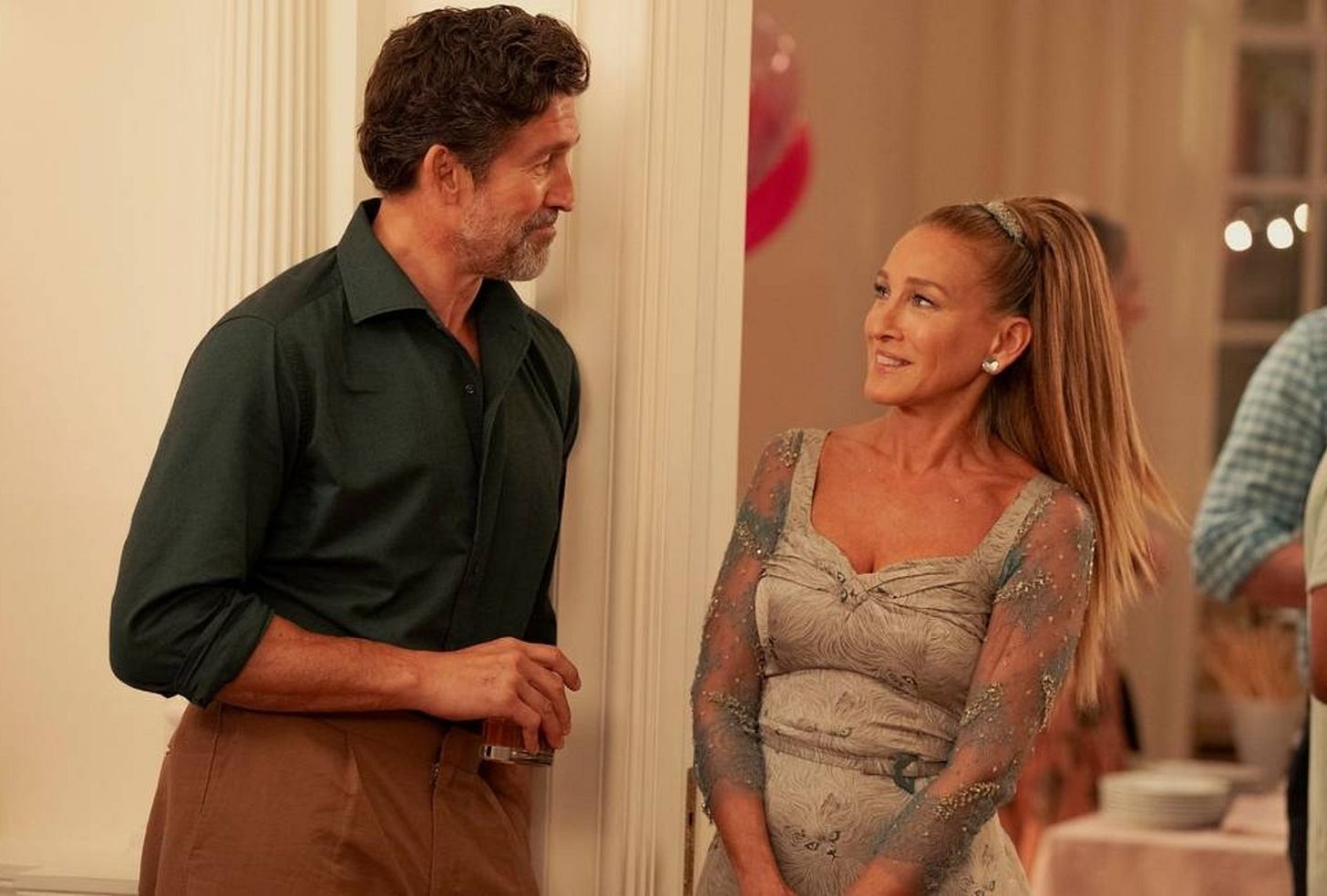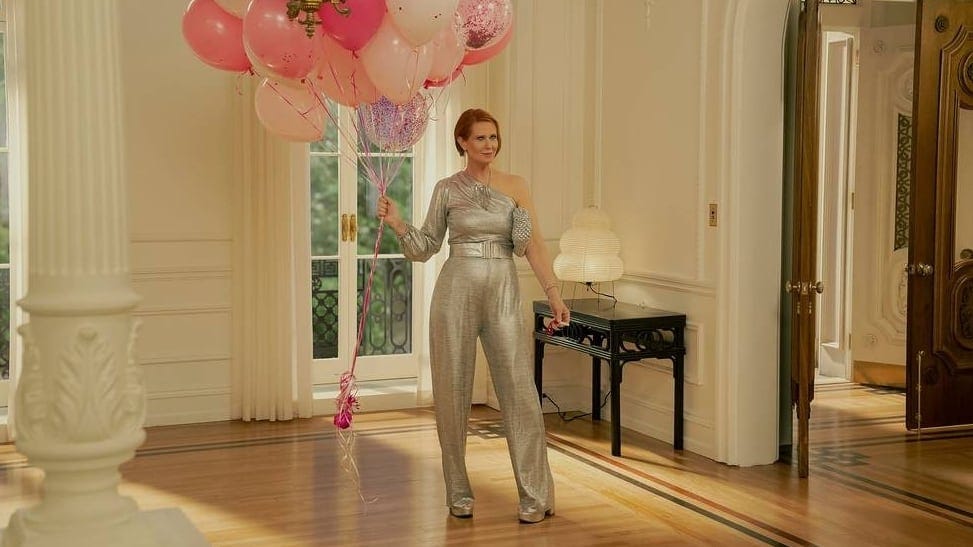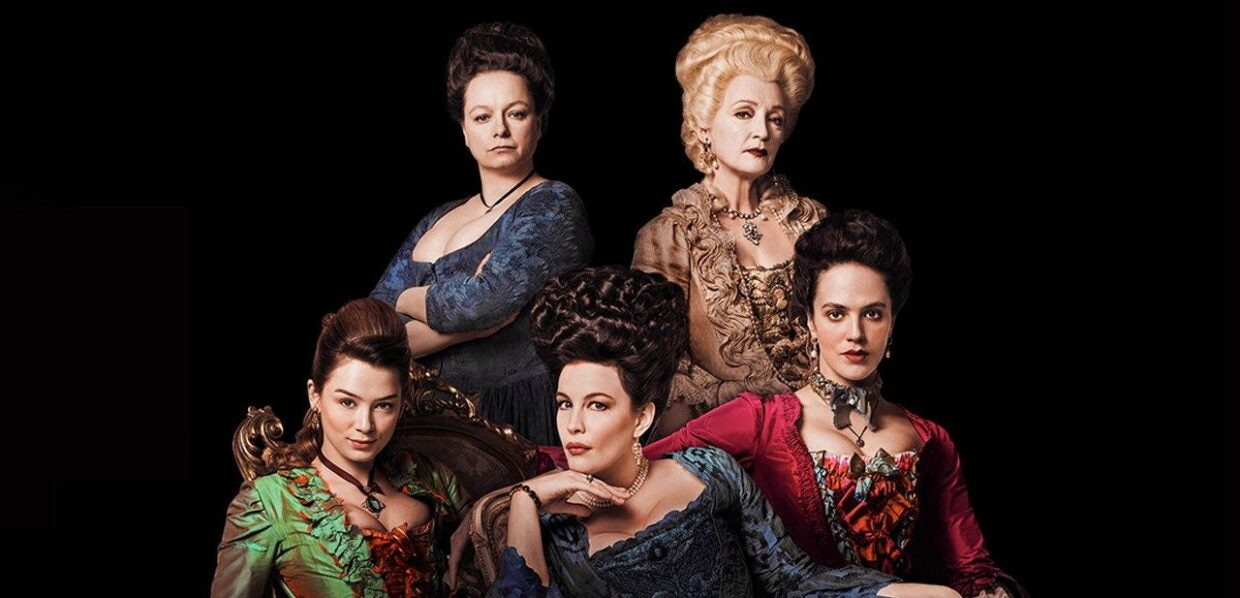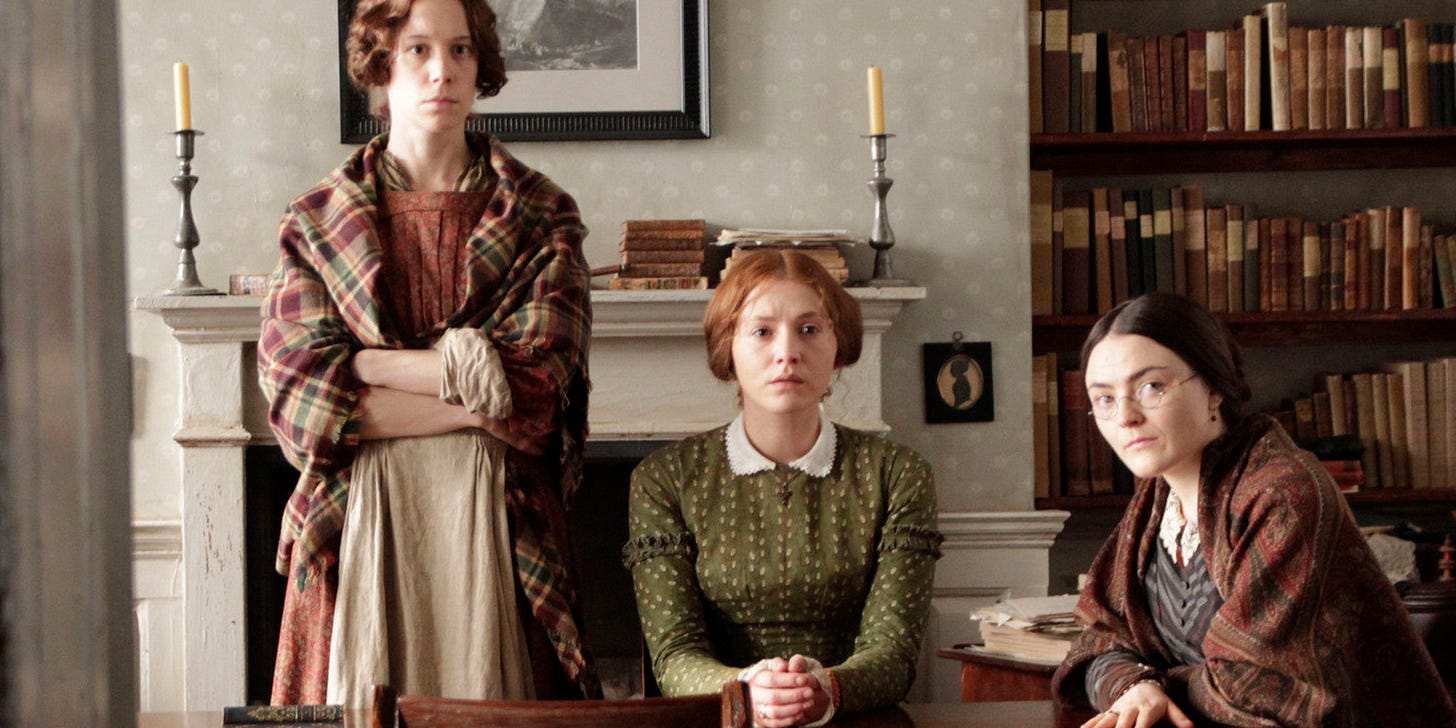Notes, reviews, consumption (the disease)
I'm watching a lot of TV while I have the flu (yes I tested and no it's not Covid)
[SPOILERS***** This article containers spoilers for Too Much (Netflix) and And Just Like That (Sky/NOW TV) *****SPOILERS]
Too Much
I stopped and started, but I did ultimately watch the whole of Too Much (Netflix), Lena Dunham kind of disappeared after Girls ended in 2017. In the interim, she suffered all sorts of crappy health stuff, met an indie musician, moved to London and married him.
Too Much has strong echoes of Dunham’s own experiences, although it stars Meghan Stalter as Jess. Dunham plays her big sister.
Girls tells us that the woman knows how to autobiography or, at the very least, auto-fiction, like no one else. But this new show is made with aforementioned musician, Luis Felber, who gets co-creator credit here. His songs are in it too.
These are things I thought while watching.
A high proportion of Brits in the show are posh/mad
Meghan Stalter as Jess (heavenly talent, huge eyes, one with the clouds) moves from New York to London to start again after a messy split. There she meets all manner of folk but every single one of them, to a man, woman and gentlethem, has money. As in, no worries about money.
The only exceptions are the characters who also live in her block of flats in east London, hanging out on the gantries like crows and exchanging obliging banter about their loves and lives. The provide set dressing but we don’t get to know any of them.
Tonally, it’s very hard to feel anything other than caught in
the wake of a torridly short attention span.
The rest are upper middle-class and comfortable. And to be posh in the Too Much universe is to be a madcap, easily distracted, emotionally detached cartoon. The two worst scenes (and I did like a lot about this show) are set at a dinner party and a wedding where the concentration of these posh/mad people is intense and the lack of variation in their personalities becomes more apparent.
I theorise that Dunham, now a UK resident herself, has come into contact with almost exclusively one kind of person since her arrival: the well connected, high born, confident offspring of the already rich who largely people the creative/media industries in London. Rich in rent-paying ability, they probably went to public school and didn’t see much of their parents growing up. So they’re nice and fucked up but can also afford the drugs to alleviate this.
Nothing seems to matter to anyone, they blithely lose their children, look distractedly at the horizon and talk of living “just on a mattress in a warehouse” one day. Tum-tee-tum, pass the ket. Dunham’s lampooning them for sure, but her observations seem to be very much on one note. Oh my god, you guys, British people are nuts.
The background cast is often jewelled with really famous people like Naomi Watts and Andrew Scott. They’re all playing self-absorbed cretins and the performances are often very nice, but it’s a finger hitting the same piano key eternally.
Every woman wants Felix
Felix is played by the brilliant Will Sharpe who embodies the doomed indie child aesthetic like a young Robert Smith regarding his chipped black fingernails and pondering the perfect rhombus of his jaw in a coke-smeared mirror.
Every single female character has had him or wants him, which seems to suggest that Dunham is so madly in love with her own husband and imagines, on some level, that all the world would love a piece of her sweet indie boy.
He’s pounced upon by everyone from his scorching, introspective French ex (she’s French so kisses everyone on the lips and talks in existential zingers) to Jennifer Saunders playing a version of Edina Monsoon in a nightclub.
Dunham’s intense regard for sad, beautiful, abuse-surviver Felix is clear. It often feels like having your nose pressed up against her bedroom window. More on this later.
Some truly lovely lines
“What’s wrong? You didn’t accessorise today.”
“Did you ever clean up on aisle clit?”
I can’t remember others at the moment, but during the ten episodes, I was startled and delighted more than a couple of times by great Dunham lines. And while most of the dialogue doesn’t seem to come from character at all, just a fun collection of words picked out of a tray, the ones that really hit suddenly DO display a recognition of what a character wants. It’s frustrating because it happens at all. Better if it had all been a crazed tone poem to nothing in particular.
They killed the dog
Amid the emotionally inauthentic chaos and cartoon side characters being insane, they kill Jess’ pet dog after harrowing scenes of vets working on her, Felix crying over the dead animal and then going outside and repeatedly hitting himself in the face when Jess blames him. Tonally, it’s very hard to feel anything other than caught in the wake of a torridly short attention span.
They all take drugs
Again, speaking to my theory that Dunham may not have met a wide cross-section of UK society (and why should she?), every single London-dweller takes drugs. Ket for lunch, coke for tea. From young to old, the only way repressed English people can free themselves in this show is on powder and pills and weed and mushrooms.
Jess accepts ketamine from the three Pollys (all ex-shags of Felix) at an indie gig on a city farm and they all laugh at her when she hoofs too much. It’s a Sunday afternoon and that is what these kids do for fun. Except they’re not kids - I think they’re supposed to be in their early/mid thirties. I live in east London and the city farm whig-out has yet to reach Walthamstow. But we have several suitable venues if any promoter is looking to cash-in.
Sudden emotional sunshine
There’s a scene between Jess and her ex’s new flame, Wendy (Emily Ratajkowski), in a London cafe - so tender and beautifully purging. Two women who dated the same narcissist, recognising each other for the first time, free of his perception of them. Beautifully done. Actually made me feel something. No notes. But how does this fit with the rest of the often hysteric thrusting and pouting?
Also, it would absolutely never happen in any universe, because Wendy has seen the 500+ videos Jess made and then accidentally made public where she obsesses over Wendy and her relationship with the ex.
Actually let’s talk about Chekhov’s Instagram videos
Nothing could be more disappointing than the moment you realise Dunham is going to fire the gun from act one. Right at the start, Jess begins to make instagram reels where she freely associates to camera about her ex’s new girlfriend. She sets them to private. And you think, OK, she won’t do anything with that because it would be cheap and flimsy and just not up to stick.
Then she pulls the trigger anyway. Jess picks up her phone during a work crisis to see that she is going viral because - oops - she set the reels to public, not private and now, after a year of posting obliviously, they’ve been found. The one where she accidentally sets herself on fire with a scented candle is particularly popular.
It’s shit. It’s not believable, even if Jess is chaos and distraction and so on. And THEN the fallout last for a minute or two and just fizzles to nothing. So it was pointless. POINTLESS.
This, to me, says that no one really intervened in Dunham and Felber’s vision. It doesn’t feel like a single structure person was there to make the show television-shaped or to ensure the levers and mechanisms of plot all worked properly.
Should we be watching this?
By the time we get to the sentimental wedding scene in episode 10, complete with Super-8 filter and slomo laughing, I feel as though I am standing in Dunham and Felber’s bedroom, watching them consummate while he sings a song called True Love Trajectory, giving total eye contact throughout. This doesn’t actually happen, I just feel as though they are over-sharing their very sweet love for one another while I (figuratively) watch them bone.
And Just Like That
I’ve had more messages about this programme that anything else. From pals, eminent show-runners and everyone in between. And they all say the same thing.
“My god, this is awful. I will watch every single episode.”
My willingness to spend time with these characters, even as they become overly-annunciating kid’s TV versions of themselves, is quite inexplicable. The whole thing swings from earnest to outlandish via cancer and death with all the tonal consistency of a breakdown.
Some scenes are so badly written my face elongates until my whole head forms a giant question mark. Why? How?
The words and sometimes even the direction are turning good actors into terrible ones. It has all the comic rhythm and timing of a first date, terrible gaping edits leave awkward silences, jokes are ta-dah-ed and fall flat. It physically hurts to watch it sometimes.
The episode (last week’s? possibly this week’s) that really slayed me was the one with Charlotte’s birthday party. The one with the karaoke. Carrie’s gardener (who is really making a meal of putting some pots in a yard) Adam (Logan Marshall-Green), takes a fancy to Seema (Sarita Choudhury) and decides to serenade her with Betty Davis Eyes which goes really high and he can’t hit the notes. She, meanwhile, tries to play aroused/intrigued through one good eye and an eyepatch. I had to look away.
Then Miranda (Cynthia Nixon) has some truly excruciating business to perform while trying to encourage others up to sing a song. The universe stopped making sense, every muscle in my thighs twanged and I thought about running. I will never watch those scenes again.
And the moment which most caused me to gasp was the knock at Duncan’s door. Duncan (Jonathan Cake) is, we’re told by Miranda, one of Britain’s most eminent biographers. He’s writing a weighty tome on Thatcher and spends his days burning stew, sucking on a pipe and poring over research in his ill-lit basement.
When Carrie arrives to ask him something, he answers the door clutching the pages she’s given him to read - the first chapter of her historical novel. He is awe-struck. This sex columnist and shoe fetishist has, according to his expression, found a literary voice unlike any other.
Then he reads the first line of her book that has so taken his breath away. He reads it out loud.
“The woman wondered what she’d gotten herself into.”
He continues to boggle at its genius. “It just stopped me dead in my tracks,” he says as Carrie demures.
THE WOMAN WONDERED WHAT SHE’D GOTTEN HERSELF INTO. That’s the line they came up with as the ground-breaking opener. One for the history books, lads.
There’s so much more nonsense in there - the way Dolly Wells, one of our very best comic and dramatic actors, looks like an ironing board which can only be the way they’ve directed her. I’ve loved Cake in loads of stuff, most particularly Julia Davis’ Camping and to be fair, in AJLT he is managing to stay afloat in a raging sea of terrible dialogue. But they’re all capable of far better.
This show makes good people bad. Aiden’s truck wank. My god, don’t get me started.
Somehow, the overall effect of dragging these characters forward in time seems to have been to make them all arseholes. Miranda’s an arsehole now. Charlotte’s a total arsehole. Lisa Todd-Wexley wasn’t even there at the start but now she’s an arsehole too. Seema’s a terrible arsehole. Carrie’s a full clip-clopping arsehole.
I just can’t stand any of them and yet I will keen and wither if I don’t see every single episode of this godforsaken series.
There’s no help for me.
I’ve also, while laid-up, done a complete re-watch of Harlots which has just come to Netflix. It’s inspired by Hallie Rubenold’s brilliant book The Covent Garden Ladies and features Lesley Manville as the most evil TV character of all time, Lydia Quigley, Madam Death to her friends, the most ambitious and avaricious madam in Georgian Soho.
Her adversary is former protegee Margaret Wells (a staunch Samantha Morton) who runs a down-at-heel knocking shop in another part of town but has her sights set on loftier surroundings.
The plots and schemes of 18th century London flow as freely as the contents of the chamber pots flung daily from the upper windows of Greek Street. You can almost smell it. And the costumes are fabulous. I’ve nearly finished the third and final series and will be bereft when it’s done.
I also did a re-watch of Sally Wainwright’s To Walk Invisible which was her muscular take on the writing lives of the Brontë sisters. I had just returned from my first ever visit to Howarth and the Parsonage Museum where the domestic lives of the three women - Ann, Charlotte and Emily - have been beautifully recreated in their former home.
Then I got ill with flu and decided that watching a film in which two of the three sisters expired of TB, pale and spluttering, was a good thing to do. It’s a brilliant film though and looks to have used the real parsonage where possible.
I’ve rambled. Well done if you got this far.


